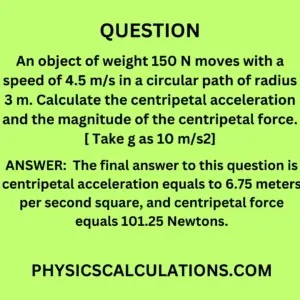Question
An object of weight 150 N moves with a speed of 4.5 m/s in a circular path of radius 3 m. Calculate the centripetal acceleration and the magnitude of the centripetal force. [ Take g as 10 m/s2]
Answer
The final answer to this question is centripetal acceleration equals to 6.75 meters per second square, and centripetal force equals 101.25 Newtons.

Explanation
Data: Revealed information from the question
Weight of the object, W = 150 N
Speed of the object, V = 4.5 m/s
The radius of the circle, r = 3 m
Unknown: Unrevealed information from the question from the question
mass of the object, m = ?
Centripetal acceleration, a = ?
Centripetal force, F = ?
Formula: The equations that will help us solve the problem
Step 1: To find the mass of the object, we will apply
m = W / g [This is because weight (W) = mass (m) x force of gravity (g)]
We made m subject of the formula from W = m x g
Step 2: To find the centripetal acceleration, we will use
a = V2 / r
Step 3: Finally, to find the centripetal force, we will apply
F = mV2 / r
Solution
We will now insert our data into the formula to solve the problem
Mass of the object
Since m = W / g
We will now have
m = 150 / 10 = 15 kg
Centripetal Acceleration
We will now move to step 2 by applying a = V2 / r
Hence, a = V2 / r = (4.5)2 / 3 = 6.75 m/s2
Therefore, the centripetal acceleration is 6.75 meters per second square
Centripetal Force
We will now use F = mV2 / r to find the centripetal force
Thus, F = mV2 / r = [15 x (4.5)2] / 3 = 101.25 N
Therefore, the centripetal force is 101.25 Newtons
You may also like to read:
How to Calculate Centripetal Acceleration
How to Calculate Centripetal Force
Simple Harmonic Motion (SHM): Understanding the Basic Concepts